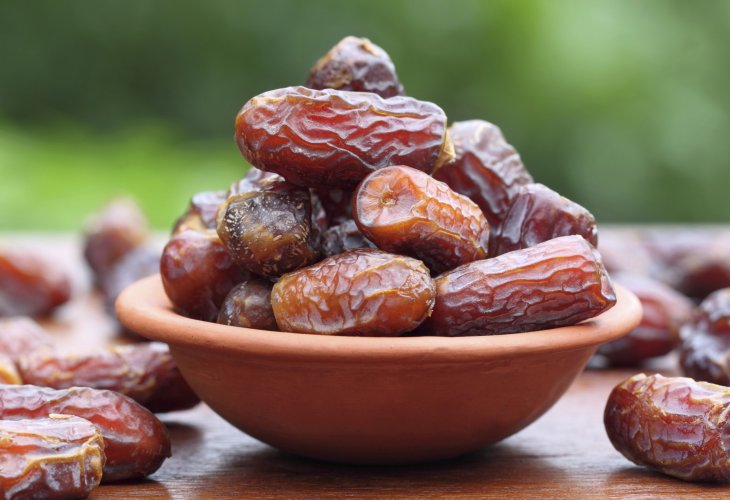Land Flowing with Milk and Majhool: Bitter Facts about Dates
Israeli fruits don't always exempt us from the need to tithe. Here are some not-so-sweet facts about dates

It seems there isn't a Jew who hasn't encountered dates in the past month, starting with the Rosh Hashanah symbols that just passed, or as decorations for Sukkot. These are still prominently displayed in markets, offered in various stages from moist to dry for eating or baking. We might find ourselves in a popular store where the temptation to take some dates is great, and well, what could be wrong – Orlah? The date palm only yields fruit after three years anyway, so there's nothing to worry about. But what if the fruits aren't tithed? Well, we can tithe them at home; that's why we have a subscription to the tithing fund...
Well, this requires some reconsideration.
Israel is the world's largest and best exporter of dates, as the method of growing dates is particularly suited to the local climate that combines heat, humidity, and saline soil. Specifically, in the Syrian-African Rift area, which runs from Eilat in the south to Tiberias in the north through the Arava, Sodom Plain to Jericho, the Jordan Valley, and from there to Beit She'an up to Tiberias. However, these areas have special complexities because they are on the ancient border of the Land of Israel established by Ezra, starting from "Maaleh Akrabim" in the south, so Eilat and the southern Arava and Negev are considered outside the land, and northward from there to the outskirts of biblical Beit She'an, which is also considered outside the land. Moreover, the border line doesn't run directly and continuously but zigzags, leaving many enclaves. Additionally, today we don't have clear knowledge about the location and names of the ancient cities. Thus, a situation arises where in one plantation or in different plantations that reach the same packing house, there are crops that are obligated to be tithed and crops that are exempt, which prevents the separation of tithes in a comprehensive manner as is customary with other types of fruits. After all, it is forbidden to separate from the exempt for the obligated. Therefore, there is no chance to properly tithe the piles of dates in the store, which are composed of a collection from different packing houses and plantations as the store owner sees fit, after they have also passed through the hands of the distributor.
When there is strict kosher supervision, the separation of tithes is done at the packing house in a way that each shipment of dates is sorted and checked by areas before the tithes are separated.
And if you still desire loose dates – don't buy from the pile; underneath the shelf hides the large package, take from it, perhaps it has strict kosher certification. And even if not, tithe to be stringent. You can assume that the dates in the package haven't been mixed with other dates, so everything in it is from the same plantation and the same growing area.
In practice, dates are divided into families and different varieties. Most varieties grown in the country were smuggled from Iraq and Egypt, and among them are the Barhitamri - the yellow date, Hayani - a moist date in red color. Other varieties existing in the country: Majhool, Deglet Noor, Halawi, Khadrawi, Zahidi, Deri, and Ameri.
The prominent dry dates in stores today are mainly four:
The Majhool date is crowned as the king of dates, with a tall and high stature, a fleshy and fatty body, and it is very sweet. The Majhool date is the cleanest from worms, and usually when it is infested, it shows in its external appearance as a kind of slime or round holes. The black spots are merely growth defects.
The Khadrawi date is the date that most resembles Majhool, although it is smaller and cheaper. The Khadrawi can be a good substitute for Majhool, but infestations are more common in it.
The Ameri date - the brother of the "Khadrawi," but drier and less sweet than it.
The Deglet Noor date - looks different from its peers, its appearance is flawless, its skin will try to be whole but dry, and some will prefer its subtle sweetness. However, not always is its inside like its outside. Sometimes it looks very beautiful, but its inside is very wormy. The problem: inside the Deglet Noor date are string-like fibers, so the infestations that develop under the stalk of its head can hide under the strings. And the infestation in it will look like crumbs.
Coarse date paste - if you are from the communities that wrap wheat in dates and eat "Ba'aba" cookies, know that the cookie filling is made from "pickled date" (Beit She'an dates), which is actually a coarse date paste from the inferior ones in the Khadrawi family. To this day, no strict kosher certification has been found for the "pickled date," because it is made from dates that are presumed to be infested, which even in retrospect grinding did not help, because the size of the cutting is not enough to crush and nullify the worms.

